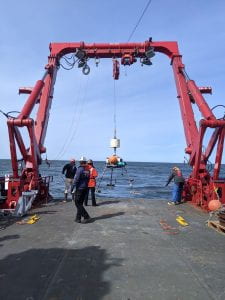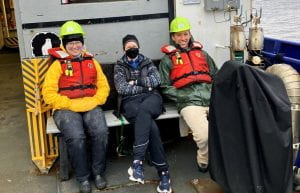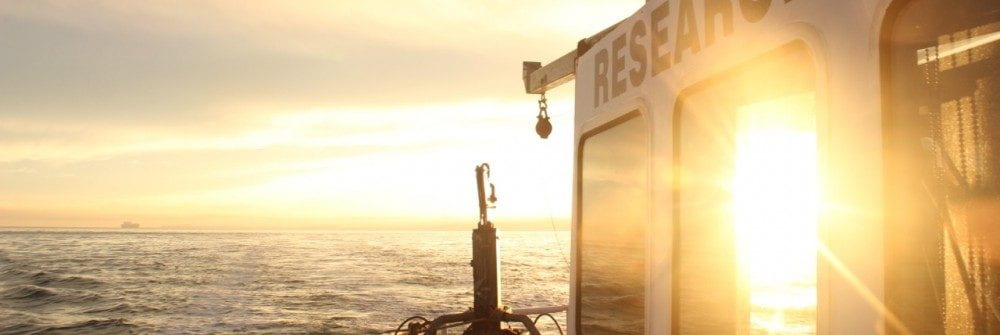 A successful cruise on the R/V Sikuliaq in early April, 2023, has kicked off our year-long experimental program exploring sediment gravity flows on the Cascadia Margin. We placed moorings and bottom boundary layer tripods in the upper canyon reaches of two systems: Astoria and Quinault. These two canyons have very different morphologies and relationships with their modern-day sediment supply, the Columbia River. With the instrumentation we are hoping to capture a range of sediment gravity flows over the year-long deployment. Seabed coring of the canyon thalwegs and surrounding continental shelf and slope give us clues as to triggering mechanisms, gravity-flow dynamics and seabed deposits resulting from these flows. UW Sediment Dynamics group participants: Andrea Ogston, Chief Scientist; Evan Lahr, Tripod Builder and Coring Op Lead; and Sarah Vollero, Coring Ops.
A successful cruise on the R/V Sikuliaq in early April, 2023, has kicked off our year-long experimental program exploring sediment gravity flows on the Cascadia Margin. We placed moorings and bottom boundary layer tripods in the upper canyon reaches of two systems: Astoria and Quinault. These two canyons have very different morphologies and relationships with their modern-day sediment supply, the Columbia River. With the instrumentation we are hoping to capture a range of sediment gravity flows over the year-long deployment. Seabed coring of the canyon thalwegs and surrounding continental shelf and slope give us clues as to triggering mechanisms, gravity-flow dynamics and seabed deposits resulting from these flows. UW Sediment Dynamics group participants: Andrea Ogston, Chief Scientist; Evan Lahr, Tripod Builder and Coring Op Lead; and Sarah Vollero, Coring Ops.
 The project is being undertaken through a collaboration with the USGS Pacific Coastal and Marine Science Center (led by Dr. Jenna Hill and Kurt Rosenberger). In addition, we had the pleasure of being joined on the cruise by a UW Sediment Dynamics alumni, Dr. Emily Eidam, Oregon State University, and graduate students Adrian Heath (OSU) and Jonathan Moore (V Tech).
The project is being undertaken through a collaboration with the USGS Pacific Coastal and Marine Science Center (led by Dr. Jenna Hill and Kurt Rosenberger). In addition, we had the pleasure of being joined on the cruise by a UW Sediment Dynamics alumni, Dr. Emily Eidam, Oregon State University, and graduate students Adrian Heath (OSU) and Jonathan Moore (V Tech).
